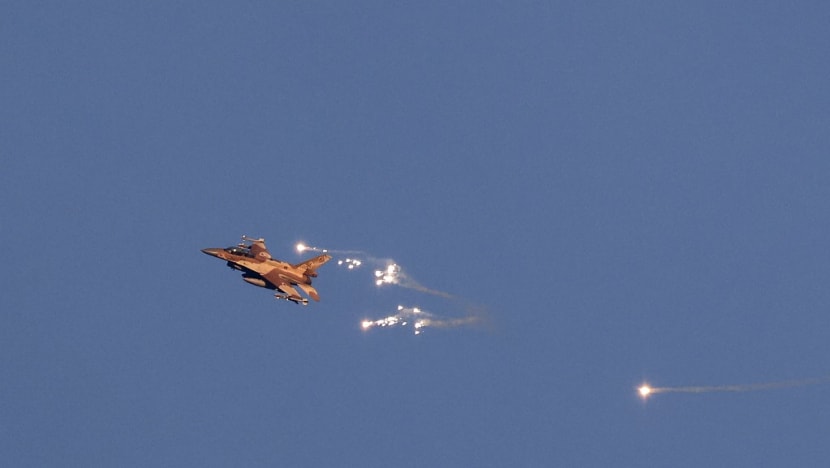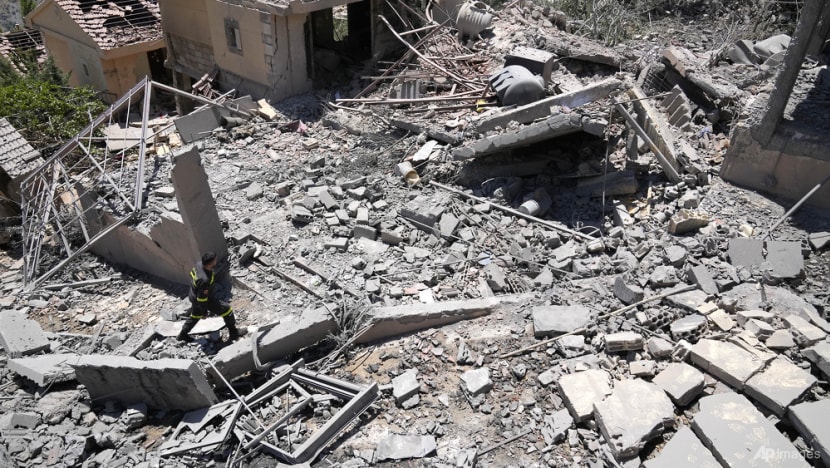Heavy fire exchange between Israel, Hezbollah was carefully calibrated to avoid wider war: Analysts
Hezbollah launched hundreds of rockets and drones at Israel on Sunday (Aug 25), as Israel's military said it struck Lebanon with around 100 jets to thwart a bigger attack.

This photo taken from a position in northern Israel shows an Israeli Air Force fighter jet firing flares as it flies to intercept a hostile aircraft that was launched from Lebanon over the border area with south Lebanon on Aug 25, 2024. (Photo: AFP/Jalaa Marey)

This audio is generated by an AI tool.
Israel and Iran-backed Lebanese militant group Hezbollah exchanged heavy fire over the weekend in a major flare-up of tensions, following more than 10 months of border clashes fuelled by the Gaza war.
This again renewed fears of an all-out war in the Middle East – but analysts said that the strikes were carried out in a way to avoid this.
“Both Israel and Hezbollah calibrated their operations very carefully to avoid an escalation or an evolution of the hostilities into a full-fledged Middle East war,” said James Dorsey, an adjunct senior fellow from Singapore's S Rajaratnam School of International Studies.
“Neither Israel nor Hezbollah nor Iran, nor their various backers – the United States, Russia, Syria, France – want to see an escalation of the war,” Dorsey told CNA’s Asia Tonight programme on Sunday (Aug 25).
The two sides have also exchanged messages that neither wants to escalate further, with the main gist being that the exchange was "done", two diplomats told Reuters.
WHAT HAS BEEN HAPPENING
People in Lebanon and Israel, which share a border, have been bracing for a wider conflict for nearly a month after a missile strike in Israeli-occupied Golan Heights killed 12 youths.
On Saturday, the Israeli military carried out strikes against alleged Hezbollah missile launch sites in southern Lebanon, which it said was to pre-empt a more deadly attack.
Hezbollah then launched hundreds of rockets and drones at Israel early Sunday, claiming to have hit 11 military targets in Israel.
This was a reprisal for an Israeli retaliatory strike that killed Hezbollah’s top commander Fuad Shukr in Beirut last month, with the group's leader Sayyed Hassan Nasrallah saying the operation was completed “as planned”.
However, he also said the group would assess the impact of its strikes and "if the result is not enough, then we retain the right to respond another time".
Israel's foreign minister said the country did not seek a full-scale war, but Prime Minister Benjamin Netanyahu warned: "This is not the end of the story."

HEZBOLLAH’S TIMING, OBJECTIVES
Dorsey said the timing of Hezbollah’s attack could point to more than just retaliation, as a ceasefire deal for Gaza remains elusive.
“That partly was presumably for Hezbollah to respond to stepped-up Israeli attacks, and to reassert its deterrence capabilities,” he noted.
“It may also have very well been intended to pressure the US, Qatar and Egypt – the mediators in the Gaza ceasefire talks – as well as Israel to come to an agreement that would also end the hostilities on the Israel-Lebanese border.”
However, Dorsey said Hezbollah’s strikes had put Iran in a spot, given that Iran likely did not want Hezbollah to attack before ceasefire negotiations either break down or lead to a halt in fighting.
Senior research fellow Jean-Loup Samaan from the National University of Singapore’s Middle East Institute said Hezollah’s objectives seemed mostly to save face and restore confidence about its intention to retaliate for Shukr’s killing.
He told CNA’s Asia First programme on Monday that Hezbollah was “cautious” about only targeting military sites, leading to “relatively small” damage on Israel.
“It’s possible that Iran asked and demanded Hezbollah to be restrained,” Samaan said.
“It’s also very possible that Hezbollah itself doesn't want to go to war with Israel, because that would mean devastation (and) damage to Lebanon, which would be horrific.”
He added that such consequences are likely to compromise Hezbollah’s political influence and position in Lebanon.
WILL THERE BE MORE ATTACKS?
Experts said Iran, rather than Hezbollah, is more likely to make the call in terms of any potential escalation in the region, especially with the killing of a top Hamas leader on Iranian soil last month.
Ismail Haniyeh, who led Palestinian militant group Hamas’ political bureau, was killed by a missile strike in Iran's capital Tehran about a month ago. The strike was widely assumed to have been carried out by Israel.
Haniyeh’s assassination also sparked fears of a broader conflict, but experts then told CNA this depends on how Iran responds in due course.
Samaan said: “The big question is: Is this attack that we saw from Hezbollah (on Aug 24) one final chapter, or the first chapter of another wave of attacks that Iran or Iran's proxies in the region could launch in coming days?
“That is, I think, the biggest unknown at this point.”
Hezbollah is the most prominent actor in the so-called axis of resistance, which are regional pro-Tehran armed groups opposed to Israel – including Hamas.
Dorsey said he also does not think the red line has been crossed so far, but cautioned that all sides will now have to “very carefully calibrate” their military operations.
“All it takes is a mistake for something to go wrong,” he added.
“We are on the edge of a precipice, but it's in the hands of the actors themselves – the degree to which they can ensure that it does not spin out of control.”
HOW TRUCE TALKS COULD BE AFFECTED
With Gaza ceasefire negotiations in Egypt still failing to produce an agreement, Samaan said the ongoing escalation between Israel and Hezbollah “does not help with the diplomatic environment”.
Nevertheless, he pointed out that Israel-Hezbollah tensions are mostly “disconnected” from ceasefire talks.
“That's at least what the Israelis have been trying to say – we saw the Israeli delegation going to Cairo without considering that the ongoing escalation with Hezbollah could compromise the talks,” Samaan noted.
“My personal opinion is that the talks between Israel and Hamas are at this point undermined, mostly by the demands of both sides, and demands which have been changing very regularly.”















